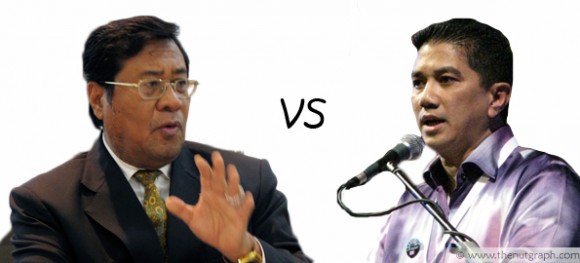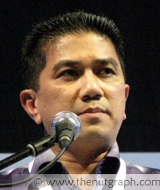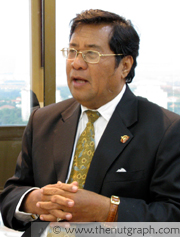
THIS week, The Nut Graph asks political scientist Wong Chin Huat to comment on Parti Keadilan Rakyat (PKR) vice-president Azmin Ali’s supposed party tussle with Selangor Menteri Besar Tan Sri Khalid Ibrahim.
TNG: What is the significance, if any, of Azmin Ali replacing Tan Sri Khalid Ibrahim as PKR Selangor chief? Does this indicate that Azmin has the party leadership’s support in the recent “uprising” against Khalid?

Wong Chin Huat: Khalid’s replacement by Azmin as the state party boss suggests that Azmin is further well-placed to control the state party machinery and even to take over Khalid’s menteri besar post in the future. However, for the moment, the party leadership would not want Khalid, who is more popular with the public for his resistance to cronyism, replaced. They only want Azmin to shape up the party machinery and take on Barisan Nasional (BN).
Is there any legitimacy to criticisms over Khalid’s leadership in Selangor? Is it a question of potential PKR rent-seekers unhappy at being denied state contracts? Or is there a genuine problem with bureaucracy and decision-making in Khalid’s administration?
Khalid clearly lacks political acuteness. He is too gentle to fight off Umno’s offensive. Case in point: his compromise to the Shah Alam cow-head thugs after they turned the town hall meeting, which was held to resolve the problem, into chaos.
He will also not assert his power against the Umnno-controlled state apparatus, from the police to the bureaucracy. He is an establishment person.
However, what has really turned off many party chieftains — big and small — is that he refuses to practice Umno/BN-style patronage politics. They want to preserve the old order but with them in charge.
In that sense, Khalid is simply not Umno enough. But this dissimilarity with Umno is both his strength and weakness. What’s the point of getting a reformed version of Umno to replace the corrupt Umno?
Will the new line-up with Azmin heading Selangor and Datuk Zaid Ibrahim heading Federal Territories PKR have any bearing in the party election at the end of 2010?

Azmin and Zaid will have a good chance to build up their support. The No. 2 position in PKR, currently held by Dr Syed Husin Ali, will likely be vacant in the party election.
Azmin will likely go for it while his rival Saifuddin Nasution Ismail will probably back a more popular figure… to stop Azmin’s advancement and expansion. And that could be Zaid.
Without adequate funding, PKR will obviously face challenges in extending its reach amongst the electorate. Is a lack of resources causing the disquiet against Khalid? Should the party look to the PKR-controlled state for financial support?
There are actually two issues which annoy many party loyalists: political appointments and party funding.

While sharing the spoils with your soldiers and warriors is inevitable to some degree in politics, treating public offices and GLC (government-linked company) posts as party property would simply mean that PKR is the new Umno plus MCA and MIC. What Khalid should do is set clear criterion for all political appointments, with some categories open to qualified party leaders, while others go exclusively to technocrats.
PKR, however, has itself to blame in lacking funding. [On funding,] it takes two extremes: either transferring state funds through contracts and projects to party coffers, ala Umno; or not doing anything. It should have introduced international best practices by legally providing state funding to all parties which won a certain minimum percentage of popular votes in the last state election.
In other words, public funding should be made available not only to PKR, DAP, PAS and Parti Sosialis Malaysia, but also to Umno, MCA, MIC and Gerakan. If the BN parties do not apply, the PR parties can share the entire sum amongst themselves. If the BN does not reject these funds, then the PR should push for the same reform at the federal level and also in other states.
There is no such thing as a free lunch. If the state does not foot the bill for party organising and mobilising work, politicians will simply turn to business interests or embezzle public funds.
Are there any other issues arising from out of all this?
There is a structural factor for PKR’s factionalism that may continue to plague the party and its allies. Namely, there is a federal-state mismatch in personalities and resources. PKR parliamentarians without central party posts now act as a pressure group because they have much less resources than their juniors in the state assembly.
For the next elections, PKR will need to decide where to place its most aggressive politicians. Put them in Parliament and you risk the same problem if you only win power at the state level. Put them at the state level and you risk not having experienced personalities to fill the federal cabinet should you win. Place them both at federal and state seats like Khalid and Azmin, you are denying others — especially the younger generation — an opportunity to serve and perform. It requires a thorough rethinking of democratisation, which PKR and PR do not seem to be doing at the moment. ![]()
Wong Chin Huat is a political scientist by training and a journalism lecturer by trade. If readers have questions and issues they would like Wong to respond to, they are welcome to e-mail editor@thenutgraph.com for our consideration.
Read previous Uncommon Sense columns
The Nut Graph needs your support


faith04 says
In other words, public funding should be made available not only to PKR, DAP, PAS and Parti Sosialis Malaysia, but also to Umno, MCA, MIC and Gerakan.
===========================================
Agree with Wong’s proposal of state funding to political parties, & it should be done in fair & transparent manner.
Ellese A says
Interesting proposal by Wong on distribution of funds. But to set as an example make BN take it. Don’t take it back. The same applies to Kelantan, Penang as well and other PR states. This [would] distinguish them from all political parties in the world. Then couple this with transparency where and how funds are obtained and spent. If they do this they will get my vote. Currently the financial statements of all parties including PR are too vague and opaque. Many sums are unaccounted for. For example where do money for billboards posters for dinners, etc come from. No political parties now provide accurate accounts of by-election funding and expenses, for example. All parties are guilty and for the record this includes PAS (where now we know its funds are obtained through explicitly so-called charity requests by companies given contracts/concessions by the Kelantan government).
I’m all for it if Chin Huat can pursue a revamp of political funding. This is the crux of the political maladies we’re in and applies to PR as well especially when now they are governing. They need funds to manage. Question is from where and what favours are expected from the donors? Chin Huat idea is good but not comprehensive enough.